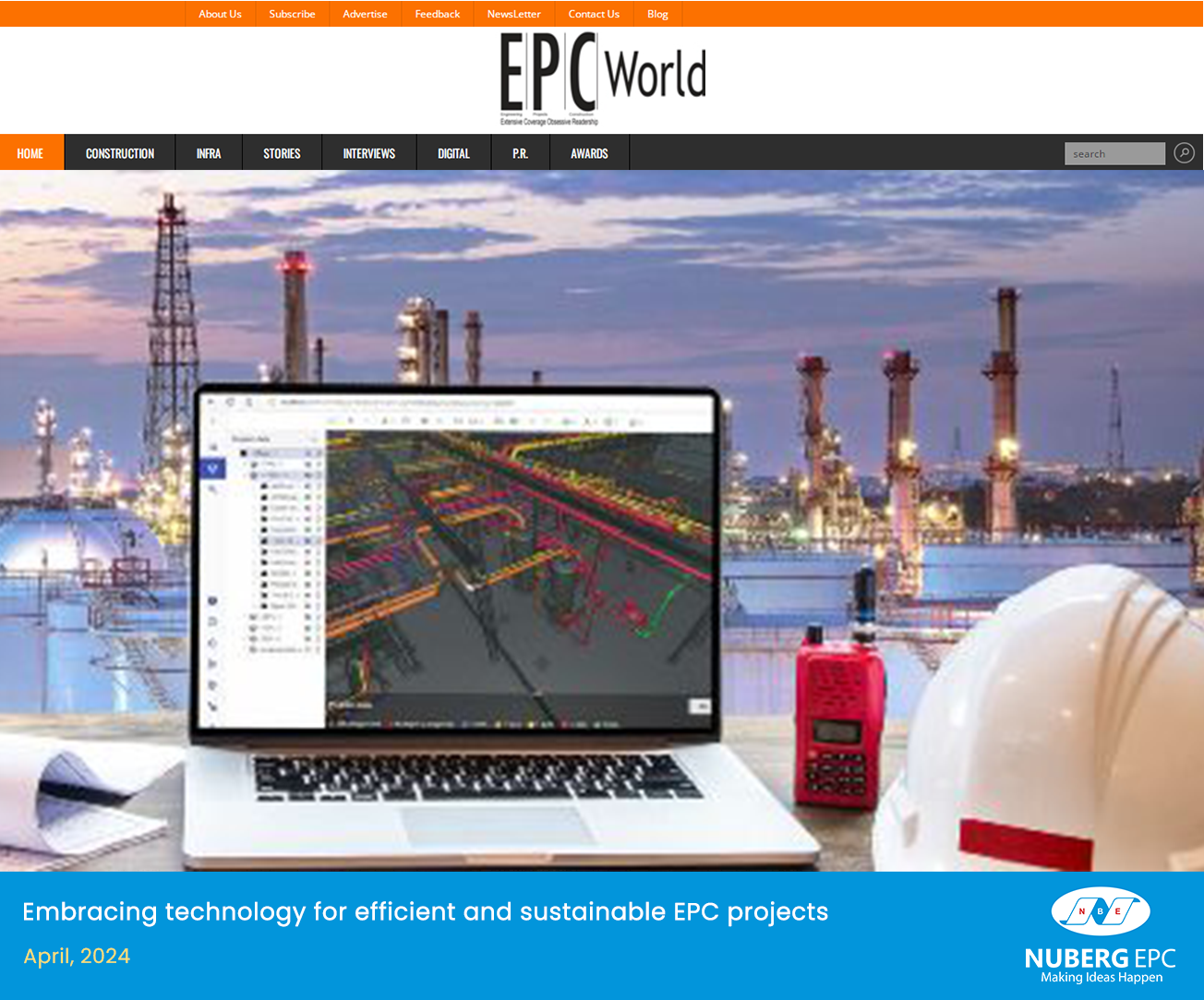Embracing technology for efficient and sustainable EPC projects
by AK Tyagi, CMD, Nuberg EPC
EPC World, 24 April, 2024

In the fast-paced sector of Engineering, Procurement, and Construction (EPC), the wave of technological innovation is not just a trend but a transformative force reshaping the landscape. This article ventures into the heart of this transformation, exploring how cutting-edge technologies are being harnessed to drive unprecedented levels of efficiency and sustainability in the management and execution of construction projects. From digital tools to sustainable methodologies, the EPC industry stands on the cusp of a new era where technology is not just an enabler but the cornerstone of future development.
Digital Transformation is a major trend in the EPC industry. Building Information Modelling (BIM) has revolutionized the industry by creating digital representations of projects. The use of Industrial IoT and smart sensors has enabled real-time monitoring of construction sites. Big data analytics is a key tool for decision-making, helping project managers predict outcomes and optimize processes.
Sustainable practices are now an integral part of the EPC industry. Projects are increasingly adopting renewable energy sources such as solar and wind power to develop green buildings and infrastructure that are energy-efficient and environmentally responsible.
Advanced Project management software
The modern business environment is constantly evolving, which makes EPC (Engineering, Procurement, and Construction) projects more complicated. To tackle these challenges, project management software has become a critical tool for project managers. These software solutions offer a comprehensive approach to project management, with features that enable effective collaboration, streamlined processes, and successful project delivery.
Advanced project management software goes beyond basic scheduling and task management. It optimizes resource allocation based on various factors, such as skills, availability, and project priorities. Collaboration tools facilitate communication among project stakeholders, enabling teams to work together in real-time, share documents, and resolve issues promptly. Customizable workflows accommodate variations in EPC projects based on industry, scope, and location.
Effective project management requires constant oversight, and data visualization is key to achieving it. Visual dashboards offer real-time insights into project progress, budget utilization, and potential bottlenecks. Advanced software assesses project risks, identifies mitigation strategies, and tracks their implementation to minimize uncertainties. Mobile-friendly software enables real-time updates, issue reporting, and approvals from any location, making it easy for project managers and field teams to access necessary information on the go.
Comprehensive project management software like AUTOCAD LT, STAAD-PRO, AUTOCAD 2D, AUTOCAD, ETAP, and PV ELITE is indispensable for contemporary project managers. It supersedes conventional approaches, offering stronger, more adaptable solutions that bolster technology-driven methodologies and enhance project assessment.
With these software tools, project managers can effortlessly monitor project progress, pinpoint potential issues, and implement necessary enhancements to ensure on-time and within-budget delivery. The software offers a holistic project management approach, incorporating features like NAVISWORK Manage & Freedom, E3D, CADWORK, and ISOMEC. These features optimize resource allocation, streamline communication, and enable real-time updates, issue reporting, and approvals.
These software's empower project managers to make data-driven decisions and offer a more streamlined approach to project management. Ultimately, they facilitate project success by ensuring on-time and within-budget delivery. Technology plays a pivotal role in streamlining operations, minimizing manual labour, and advancing towards offsite manufacturing. For instance, 3D printing accelerates the production of physical components, slashing construction time and costs. Tools like HTRI aid in thermal calculations for shell & tube heat exchangers, while CAD WORX P&ID facilitates the development of intelligent P&IDs by Intergraph.
Economic and social impact
The advantages of implementing technology in the Engineering, Procurement, and Construction (EPC) industry are many. It can help reduce costs, increase profitability, enhance quality, and more. Technology can also improve the safety of projects by achieving zero incidence rates during execution. This, in turn, leads to better overall quality, resulting in a positive impact on society. Additionally, the adoption of technology in EPC has created more job opportunities and improved the skills of the workforce.
Technology has transformed stakeholder engagement, leading to better communication between government agencies, financial institutions, and communities. This has resulted in more informed decision-making and a more coordinated project development process. By ensuring that stakeholders are kept informed and involved, transparency is increased, and outcomes are improved.
Despite challenges such as skill gaps and financial constraints, continuous innovation and training are overcoming these obstacles, paving the way for more sophisticated and efficient project management practices. With the help of training programs and upskilling, employees can adapt to changing trends and technologies.
The Future: AI and machine learning
The adoption of new technologies in the EPC industry is facing various challenges. One significant obstacle is the resistance to change caused by traditional practices. Many EPC companies have been using traditional methods for a long time, which makes it difficult to introduce new technologies. As a result, there is a fear of change and a reluctance to adapt to new ways of working.
Technical and integration challenges also pose significant barriers. The EPC industry is highly complex, and integrating new technologies with existing systems and processes can often be challenging. This can lead to delays and increased costs, which can be a major concern for companies.
Moreover, cybersecurity and data privacy are major obstacles. With the increasing use of technology, there is a higher risk of cyberattacks and data breaches. Companies need to be vigilant and take steps to protect their systems and data, which can be time-consuming and expensive.
However, AI and machine learning are set to revolutionize the EPC industry in the future. These technologies promise to enhance project management practices, leading to even more successful and sustainable projects. For instance, AI-powered software can analyse data and provide valuable insights that can help project managers make better decisions.
Digital roadmap to success
The adoption of new technologies by the industry is facing various challenges, such as reluctance to change, technical and integration issues, and concerns about cybersecurity and data privacy. However, these obstacles can be overcome by developing a clear digital roadmap and investing in training and skill development. This approach will help companies identify the essential technologies required to improve their operations and enable them to prioritize their investments. Additionally, it is essential to train employees in new technologies to ensure that they have the skills and knowledge to implement and use them effectively.
To achieve sustainability goals, technology plays a crucial role, and digital technologies such as Big Data analytics, artificial intelligence (AI), and machine learning can enable more efficient resource use and reduce waste, thus contributing to the creation of sustainable infrastructure. By using data analytics, companies can identify areas where energy is being wasted and take steps to reduce consumption, leading to cost savings and environmental benefits.
Furthermore, the EPC industry can promote sustainable practices by adopting green technologies such as renewable energy sources and energy-efficient building materials. For instance, the use of solar panels, wind turbines, and geothermal systems can help reduce the carbon footprint of buildings and infrastructure projects while promoting energy independence.
The Future of EPC: Technological breakthroughs
Nuberg EPC, a top EPC-LSTK firm, has completed 65+ turnkey projects across 32+ countries in 28 years. Leading India's largest 2200 TPD Chlor-Alkali project, the company is committed to fostering a sustainable future by embracing cutting-edge technologies such as ERP, Detail & Basic Engineering. Its expertise spans complex projects like the NPK Fertilizer Plant, PPU, SRU, Bioethanol and India's first hydrogen fuelling station. With 460+ engineers, it provides global single-point responsibility solutions. The company prioritizes innovation and sustainability across industries like Chemicals & Fertilizers, Hydrocarbon, and Steel, focusing on hydrogen initiatives and ethanol production.
Looking ahead, the EPC industry is poised for a technological revolution that promises to redefine project execution. The integration of cutting-edge technologies like IoT, Big Data, AI, AR, and VR is expected to drive unprecedented efficiency and productivity. These advancements will not only optimize resource allocation and automate tasks, but also enhance worker safety and project accuracy. As the industry embraces these innovations, companies like Nuberg EPC will likely continue to lead the charge in delivering sustainable solutions and achieving superior project outcomes, thereby contributing to a more efficient and cost-effective future.
© This article was first published on EPC World, 24 April 2024.
Media Gallery
EPC World - Embracing technology for efficient and sustainable EPC projects
Download PDF


